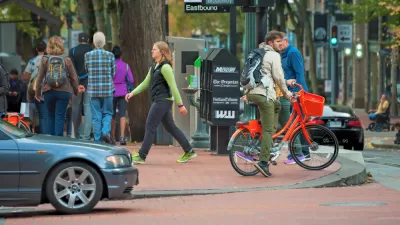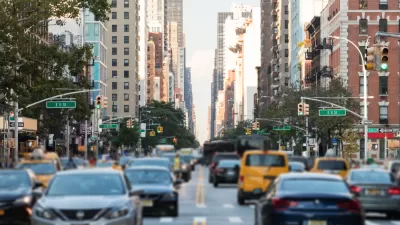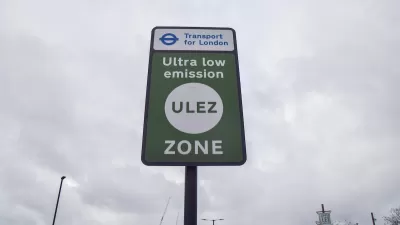A new task force formed in Portland, Oregon will consider ways to make automobile use more expensive, including parking pricing, area and time-based fees, fleet charges, road user charges, cordons, and freeway pricing.

The city of Portland is organizing a new Pricing for Equitable Mobility Community Task Force, tasked with developing new policies that will more fairly price the cost of automobiles on public roads, according to an article by Jonathan Maus. The task force will be a joint effort headed by the Bureau of Transportation (PBOT) and Bureau of Planning and Sustainability (BPS).
"PBOT Commissioner Chloe Eudaly is a major fan of congestion pricing so it should come as no surprise that she’s looking for policy and public backing to strengthen its case," explains Maus of some of the political will driving the formation of the new task force.
The city is following in the footsteps of the state of Oregon, which approved legislation in 02017 mandating the Oregon Department of Transportation to move forward with congestion pricing. "Their plan to toll I-5 and I-205 was sent to the Federal Highway Administration in December 2018," according to Maus. (Planetizen correspondent Irvin Dawid also gathered information on that plan in 2018.)
Portland's exploration into new pricing schemes are expected to be much more expansive. "In a statement, Portland said strategies that will be considered by the task force may include, but are not limited to: 'parking pricing, area and time-based fees, fleet charges, road user charges, cordons [priced zones], freeway pricing and more'."
FULL STORY: City task force will explore how to make drivers pay true cost of road use

Planetizen Federal Action Tracker
A weekly monitor of how Trump’s orders and actions are impacting planners and planning in America.

Map: Where Senate Republicans Want to Sell Your Public Lands
For public land advocates, the Senate Republicans’ proposal to sell millions of acres of public land in the West is “the biggest fight of their careers.”

Restaurant Patios Were a Pandemic Win — Why Were They so Hard to Keep?
Social distancing requirements and changes in travel patterns prompted cities to pilot new uses for street and sidewalk space. Then it got complicated.

Platform Pilsner: Vancouver Transit Agency Releases... a Beer?
TransLink will receive a portion of every sale of the four-pack.

Toronto Weighs Cheaper Transit, Parking Hikes for Major Events
Special event rates would take effect during large festivals, sports games and concerts to ‘discourage driving, manage congestion and free up space for transit.”

Berlin to Consider Car-Free Zone Larger Than Manhattan
The area bound by the 22-mile Ringbahn would still allow 12 uses of a private automobile per year per person, and several other exemptions.
Urban Design for Planners 1: Software Tools
This six-course series explores essential urban design concepts using open source software and equips planners with the tools they need to participate fully in the urban design process.
Planning for Universal Design
Learn the tools for implementing Universal Design in planning regulations.
Heyer Gruel & Associates PA
JM Goldson LLC
Custer County Colorado
City of Camden Redevelopment Agency
City of Astoria
Transportation Research & Education Center (TREC) at Portland State University
Camden Redevelopment Agency
City of Claremont
Municipality of Princeton (NJ)





























